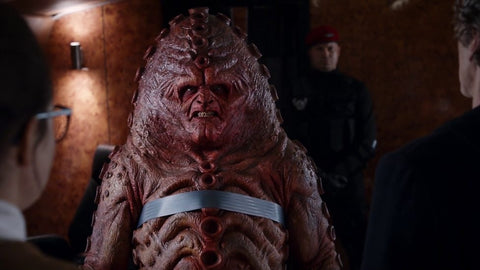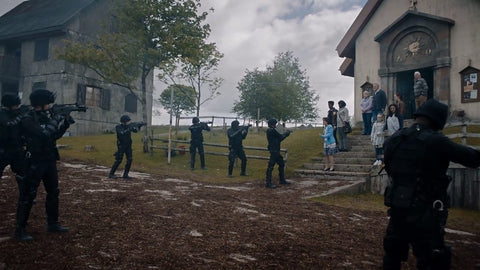Review: Face the Raven

End of the line. Here we are again, saying goodbye.
It seems only yesterday that we were bidding Amy and Rory a fond farewell, and even though Clara's been travelling in the TARDIS for a long time, it's still just as tough. Is she properly gone? We'll find out over the next couple of episodes, but for now, this is it.
We'll get it out of the way: it was immensely sad. A little odd, too.
Face the Raven is the first Doctor Who by Sarah Dollard (Being Human; The Game) and what a way to debut! Not only does she bring back two supporting characters, she also gets rid of a main companion and throws in as many aliens as possible. And all brought together thanks to the neat concept of trap streets.
They're real. Well, not entirely, but Clara's tale of cartographers including a fake street so they'd know if their work had been copied by others is entirely true – it's one of those interesting nuggets of information Doctor Who frequently unearths. With a whole world available to us online, maps on our phones and courtesy of Google, the idea of hidden streets is fascinating.
It's realised as a typical magical location, cobbles and olde worlde houses, shadows and the alien. Having an unknown landscape potentially around each corner once again harks back to those early First Doctor days when the otherworldly could be found anywhere.
A stark contrast to the futuristic visuals of last week's Sleep No More, the trap street gives director, Justin Molotnikov something new to explore. It's not as impressive as his work in the La Verrier Space Station but that's to be expected; Sleep No More reveled in its directorial brilliance, its whole premise hinging on how well it was framed.

Nevertheless, Molotnikov impresses. The trap street is bookended by bright explorations of the modern world, with echoes of The Day of the Doctor (with Clara hanging from the TARDIS, just as the Eleventh Doctor did in the 50th anniversary special), and her first 'proper' adventure, The Bells of St. John in its vibrancy.
Whether it's intentional or not, an alien mask used in The Rings of Akhaten and Nightmare in Silver also turns out to be the true face of Kabel (Simon Manyonda). Maybe there's also a bit of the town called Christmas (The Time of the Doctor) in the trap street too: regardless, with aliens cropping up left, right, and centre, viewers are reminded of the recent past with startling regularity. Judoon, Sontarans, Ood, and Cybermen turn up: Clara might not have met all of those aliens on-screen but it does round off her adventures well.
Her send-off doesn't feel entirely perfect, however. For someone so intrinsic to the Doctor – scattering herself through his time stream, talking him out of destroying Gallifrey, helping him come to terms with his new incarnation – her death is shockingly pointless.
Why does she die? Because she messes up.
She's fashioned herself in the Doctor's shadow and has been heroic through and through. Her love of life aboard the TARDIS has consumed her absolutely, but not in the same way Donna, for example, was captivated by it. Donna wanted to stay to see the universe. Clara, it seems, wanted to stay so she could save the universe.

Her final act, then, is to save as many as she can from the Doctor's revenge. She sacrificed herself for a friend she'd seemingly only met once before. Ultimately, her death comes as a result of two supporting characters, Rigsy (Joivan Wade) and Ashildr (Maisie Williams) – or Me or Mayor Me, if we must.
You can't dislike Rigsy for it, though. He was great in Flatline, and he was great here as well. Sadly, he's not given an awful lot to do: Rigsy's merely a means to an end, caught up in something out of his control.
It's Ashildr who will take much of the blame from fans, I'm sure. Williams was superb in The Girl Who Died, but she was an entirely different person in The Woman Who Lived – and not a nice one. She might've carried out her plan for altruistic reasons, to save the street, but she remains far from likeable. What's more, her final scene in The Woman Who Lived, in retrospect, seems a missed opportunity. Maybe she'll return and there'll be a narrative reason for her essentially threatening the Doctor, but for now, it falls flat.
Her promise to the Doctor that humans in general (but Clara specifically) "blow away like smoke", though, is beautifully literal.
The Quantum Shade is one of the most successful aspects of the tale. The Raven is a great presence, a truly effective piece of symbolism, as is the chronolock, hanging around the necks of Clara, Ashildr, and Rigsy. The notion isn't properly explored; that's actually a good thing, adding to this almost mythical idea of a creature intent on delivering death, no matter what.

Honestly? I never suspected Clara would be killed. Not properly, and not so violently. It was a painful death. Many notable deaths of previous companions have been off-screen – yes, even Amy and Rory's living-to-death demise – but this was presented with horrific honesty.
There was nothing timey-wimey about this. Her splinters weren't involved. She didn't save the Doctor. She just died.
It's an extraordinarily brave move. We saw the Quantum Shade take her, and we saw her fall to the ground. So did the Doctor. There's something anti-climatic about it, but certainly not in a bad way. If anything, that made it even more touching.
The intimate conversation, and the words that were never said, exposed the leads' admirably. Clara was strong until the end. She was selfless and accepting. The Doctor fell apart so subtly. His rage caved in as he asked her to stay by his side. "Don't run," he says, pained. "Stay with me."
Next week, it's the Doctor's time to run. But for now...
Goodbye, our Impossible Girl. We'll always remember you.

















